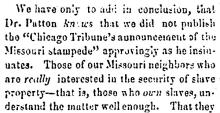OVER THE RIVER AGAIN
"Dr. Patton of the Quincy Ferry," is "put again" an answer to our comments upon his first article. He sums up the facts in the affair that took place at Mr. Harper's house and innocently asks why the Whig did not give this statement of the case! That is just the statement the Whig did give. Our account of the affair corresponded exactly with Dr. Patton's. But unfortunately for the Dr's peace of mind we copied without comment the account given by the Tribune and the Dr. Goes off half shot about it. He can make the most of it. It is a remarkable fact that you will find a certain class of men in the slave states who are very desirous of the honor of acting as champions of the institution. You will always see these men putting in their oars when the efforts are not needed and under circumstances that render them ridiculous. We don't know why this is so, but so it is––and on the other hand we never had a personal acquaintance with a Slaveholder, who had these traits of character. We have uniformly found them fair and candid men and, free from any disposition to deal in such indiscriminate and unfounded denunciation, as is characteristic of the volunteer and less interested class. We have instances of both these classes––in the immediate neighborhood of the Quincy Ferry.
Dr. Patton in his last article admits the evidence he relies upon for proving that citizens of Quincy are in the habit of enticing away slaves is the assertion of some negro. He evens gets up a silly dialogue to illustrate this. He then adds: "But Mr. Whig you may say, the only evidence we have is the statements of slaves to that effect.––Would you like to examine them, cross-question them? Thank you sir, wouldn't like to let you have them, they have been tampered with enough already."
Excruciatingly witty Dr. It happens however that you don't own any slaves, and that you are not authorized by those that do, to indulge in any such ungentlemanly and blackguard insinuation––an insinuation known to you to convey a dirty falsehood. We say that its falsity is known to you, because you have no more foundation for the miserable information, that you had, personally, for the unprovoked attack made upon us. It is true that your efforts have been productive of more amusement, than irritation, on one part, but still we will not lose sight of the fact that you made the first attack and that you made it gratuitously.––We have only had occasion to speak of you heretofore in connexion with the Quincy Ferry. Knowing your partner to be a worthy gentleman we spoke of you as such. If this furnishes any ground for your attack we will take it all back except what refers to your partner.
But the Dr. wishes us to tell the Missourians––1stly, that we have abolitionists here who will entice away their slaves, and 2dly, that "if they catch any of our abolitionists on that side of the river tampering with their slaves, to deal with them as the law requires."
The first instruction we shall not give.––We don't believe that there is any danger that any slave sent over here by his master, will be tampered with or enticed away. That assertion would involve the endorsement of a lie got up by interested persons on the other side of the river, who wish to keep our Missouri neighbors from trading in Quincy––a falsehood supported by the testimony of worthless negroes on the one side of the river, and worthless demagogues on the other; and we are sorry to see the Dr. guiled by such testimony.
As for the second instruction, we will cheerfully give it––not because the Dr. asks for it––for he has no business to ask anything in the matter––but because it is right and because it is just what we have said before. If our neighbors in Missouri "catch any of our abolitionists on their side of the river tampering with slaves, deal with them as the law provides!" That's good sound doctrine. Carry it out. You won't hear anybody over here whining about it––and more than that, you won't catch any Quincy folks at this miserable game.
We have only to add in conclusion, that Dr. Patton knows that we did not publish the "Chicago Tribune's announcement of the Missouri stampede" approvingly as he insinuates. Those of our Missouri neighbors who are really interested in the security of slave property––that is, those who own slaves, understand the matter well enough. That they or many of them––are not afraid of the "Abolitionists of Quincy," is evinced by the fact that they send their negroes here, and don't lose by it. They know well enough, that every fugitive slave case tried in Quincy has resulted in sending the slave back to his master, and that without as much excitement as would attend an ordinary assault and battery case. They are the only persons interested in the matter, and need no volunteer scribblers to defend their rights––especially when their rights are not attacked.
"Over The River Again," Quincy (IL) Whig, August 14, 1854, p. 2.

